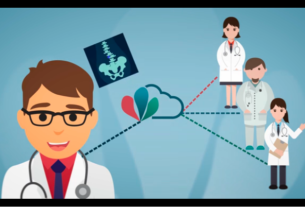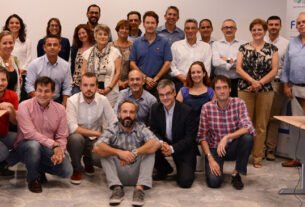Mientras que los investigadores trabajan para desbloquear descubrimientos que salvan vidas y desarrollar nuevos enfoques para problemas de salud apremiantes, los avances en tecnología pueden ayudar a acelerar y escalar nuevas soluciones.
Es por eso que Microsft está lanzando AI for Health, un nuevo programa de cinco años y 40 millones de dólares para empoderar a los investigadores y organizaciones con AI para mejorar la salud de las personas y las comunidades de todo el mundo. El programa se basa en una sólida base de privacidad, seguridad y ética, y se desarrolló en colaboración con los principales expertos en salud que impulsan importantes iniciativas médicas.
AI for Health es el quinto programa de Microsoft AI for Good, una iniciativa de $ 165 millones para capacitar a investigadores, organizaciones sin fines de lucro y organizaciones con tecnologías avanzadas para ayudar a desbloquear soluciones para los mayores desafíos que enfrenta la sociedad actual.
«Como empresa de tecnología, es nuestra responsabilidad garantizar que las organizaciones que trabajan en los problemas sociales más acuciantes tengan acceso a nuestra última tecnología de inteligencia artificial y la experiencia de nuestro talento técnico», escribió John Kahan, Chief Data Analytics Officer y líder del programa, en el blog de Microsoft y agregó que AI for Health es una iniciativa filantrópica que complementa un trabajo más amplio en Microsoft Healthcare. «A través de AI for Health, apoyaremos la colaboración académica y sin fines de lucro específica con los principales científicos de datos de Microsoft, acceso a los mejores herramientas de IA y computación en la nube, y subvenciones en efectivo seleccionadas».
En el blog, Kahan explicó que se puede lograr un gran progreso cuando la comunidad de salud global trabaja en conjunto para crear un cambio, y AI for Health puede ayudar a avanzar, acelerar la investigación y ampliar nuevas soluciones. «Ya que estas mejoras no han sido equitativas en todo el mundo».
«Hay problemas de salud reales en los que la IA puede desempeñar un papel importante, y puede ser nuestra mejor opción para acelerar la investigación o ampliar el alcance de nuevas soluciones, especialmente en áreas que pueden carecer de atención del sector de la salud comercial», escribió Kahan. Por ejemplo, la tecnología puede ayudar a escalar los exámenes de detección de retinopatía diabética, un problema que enfrentan 463 millones de personas, para expandir el alcance de los oftalmólogos, ya que solo hay 210,000 en el mundo. O en casos como el Síndrome de muerte súbita del lactante (SMSL), donde es difícil para las organizaciones invertir en investigación dado el tamaño de la población afectada, pero existen enormes efectos colaterales para comprender y mitigar la muerte general del lactante.
«Pero para tener un verdadero impacto, debemos asegurarnos de que los expertos médicos y los investigadores tengan acceso al mejor talento técnico posible, personas que puedan proporcionar su experiencia para obtener el máximo valor de la tecnología. Actualmente, el talento de IA se concentra desproporcionadamente en la industria tecnológica. Más del 50% de los profesionales de IA trabajan en tecnología, y menos del 5% están operando dentro de los sectores de salud y sin fines de lucro. Como resultado, los investigadores médicos se ven obstaculizados debido a la escasez de talento de IA en todo el mundo «, explica John Kahan y asegura que para tener éxito, debe haber un equilibrio entre privacidad e innovación, y por lo tanto, Microsoft está trabajando arduamente para ofrecer tecnologías de privacidad avanzadas, en base a privacidad diferencial, un trabajo que Microsoft e investigadores del Instituto de Ciencias Sociales Cuantitativas de Harvard inventaron hace años que permite extraer información útil de los conjuntos de datos garantizando la privacidad de las personas.
El programa AI for Health operará a través de colaboraciones que aprovechan las herramientas de AI y la experiencia técnica de Microsoft para realizar más descubrimientos médicos, generar conocimientos de salud globales y aumentar la equidad en salud en las poblaciones desatendidas.
Los proyectos actuales incluyen:
- Fortalecer la comprensión médica de las causas y el diagnóstico del Síndrome de Muerte Súbita Infantil (SMSL), en colaboración con el Seattle Children’s Research Institute
- Trabajar con la Fundación Novartis para acelerar los esfuerzos por eliminar la lepra, centrándose en el objetivo de interrumpir la transmisión.
- Implementar el software de diagnóstico de retinopatía diabética end-to-end de atención primaria, desarrollado en colaboración con Intelligent Retinal Imaging Systems (IRIS), que puede ayudar a frenar la ceguera prevenible
- Explorar nuevas formas de acceso a la información que puede conducir a avances en la investigación mediante una colaboración con el Centro de Investigación de Cáncer Fred Hutchinson y con la Iniciativa de Descubrimiento de Datos Cascadia para acelerar nuevas vías de prevención y tratamiento del cáncer
Fuentes:
https://www.microsoft.com/en-us/ai/ai-for-health
https://www.microsoft.com/en-us/ai/ai-for-goodWhile researchers work to unlock life-saving discoveries and develop new approaches to pressing health issues, advancements in technology can help accelerate and scale new solutions.
That is why Microsft is launching AI for Health, a new $40 million, five-year program to empower researchers and organizations with AI to improve the health of people and communities around the world. The program is underpinned with a strong foundation of privacy, security and ethics, and was developed in collaboration with leading health experts who are driving important medical initiatives.
AI for Health is the fifth Microsoft AI for Good program, a $165 million initiative to empower researchers, nonprofits and organizations with advanced technologies to help unlock solutions to the biggest challenges facing society today.
«As a tech company, it is our responsibility to ensure that organizations working on the most pressing societal issues have access to our latest AI technology and the expertise of our technical talent», wrote John Kahan, Chief Data Analytics Officer and leader of the program in Microsoft´s blog and added that «AI for Health is a philanthropic initiative that complements our broader work in Microsoft Healthcare. Through AI for Health, we will support specific nonprofits and academic collaboration with Microsoft’s leading data scientists, access to best-in-class AI tools and cloud computing, and select cash grants».
In the blog Kahan explained that great progress can be made when the global health community works together to create positive change, and AI for Health can help going further, accelerating research and scaling new solutions. Because these improvements have not been equal across the globe.
«There are real health issues in which AI can play an important role, and it may be our best option to accelerate research or expand the reach of new solutions, especially in areas that may lack attention from the commercial health sector», wrote Kahan.
For example, technology can help scale screenings for diabetic retinopathy – an issue facing 463 million people – to expand the reach of ophthalmologists, as there are only 210,000 in the world. Or in cases such as Sudden Infant Death Syndrome (SIDS), where it is tough for organizations to invest in research given the size of the affected population, but there are huge knock-on effects to better understand and mitigate against general infant death.
«But to truly make an impact, we need to make sure that medical experts and researchers have access to the best technical talent possible, people who can provide their expertise to get the most value out of technology. Currently, AI talent is disproportionately concentrated in the tech industry. More than 50% of AI professionals work in tech, and less than 5% are operating within the health and nonprofit sectors. As a result, medical researchers are hampered due to AI talent shortages worldwide» explains John Kahan and add that to succeed there must be a balance between privacy and innovation, and therefore, Microsoft is working hard to deliver advanced privacy technologies based on the work Microsoft and academic researchers invented years ago, called differential privacy, which makes it possible to extract useful insights from datasets while guaranteeing the privacy of individuals. This is being undertaken in collaboration with Harvard’s Institute for Quantitative Social Science.
The AI for Health program will operate via collaborations that leverage AI tools and technical expertise from Microsoft to further quests for medical discovery, uncover global health insights and increase health equity across underserved populations. Current projects include:
- Strengthening our medical understanding of the causes and diagnosis of Sudden Infant Death Syndrome (SIDS), in collaboration with Seattle Children’s Research Institute
- Working with the Novartis Foundation to accelerate efforts to eliminate leprosy by focusing on interventions that aim to interrupt transmission
- Deploying for use in primary care end-to-end diabetic retinopathy diagnostic software, developed in partnership with Intelligent Retinal Imaging Systems (IRIS), that can help curb preventable blindness
- Exploring new ways to unlock cross-organizational access to information that can lead to breakthroughs in research by working with Fred Hutchinson Cancer Research Center and the Cascadia Data Discovery Initiative to accelerate new avenues to prevent and treat cancer.
Sources:
https://www.microsoft.com/en-us/ai/ai-for-health
https://www.microsoft.com/en-us/ai/ai-for-good




